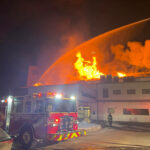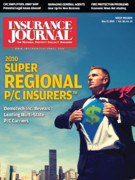Ash spewing from an Iceland volcano halted air travel and countless business meetings and deals across Europe. In Times Square, hotels and businesses were shut down after a bomb was discovered in an abandoned car along Broadway.
All around the Gulf Coast, fishermen, motel owners, restaurateurs and other small businesses were fearing the impact on their futures of the Deepwater Horizon oil spill.
Historic flooding in the music capital of Nashville, Tenn. closed the downtown – including Opryland – which might not reopen for several months.
In the Boston area, a break in a water main forced everyone to use water from a secondary reservoir that had to be boiled before use. Sam Adams brewery and Dunkin’ Donuts franchises were among the businesses closed for several days as a result.
The larger businesses affected by these calamities including the Times Square hotels and Opryland had emergency plans and insurance in place.
But what about the small businesses along the Gulf Coast, in Times Square, in Boston and in Nashville? Or the businesses they supply. The waitress at a Portland restaurant will have to explain why the Gulf shrimp special is not available, while the bartender in Austin won’t be pouring any Sam Adams summer ale.
It does seem that Mother Nature and man are conspiring to make life as difficult as possible for small business owners, especially if they happen to be near a coastline.
Insurance won’t always have the answer – there are conditions, exclusions and waiting periods. But ignoring the risk is also not an answer.
One of the very first topics I ever heard Insurance Journal’s resident insurance expert, author and educator, Christopher J. Boggs, discuss at-length was business income coverage. Not so much the coverage – although he knows that inside and out – but more about how bothered he is that so few business owners buy it.
Boggs, director of the Insurance Journal Academy of Insurance, in his timely new book, Business Income Insurance Demystified, writes that almost one-third of businesses that are shuttered by a property disaster such as a serious fire never reopen after the event. Without income, no business survives very long.
Business interruption insurance covers profits that are lost and continuing expenses such as salaries, rent and utilities when a company is forced to shut down by a disaster, or even by an event such as an extended power outage.
Boggs believes that insurance agents and brokers too often either fail to sell or they improperly structure business income coverage, setting up their clients for business failure following a major loss.
In effect, while not buying business interruption insurance is one of the biggest mistakes small businesses make, not correctly selling business income protection is probably one of the biggest mistakes agents can make.
Employers rarely think about their business not being able to open; they need agents to remind them.
Perhaps we should all grab a copy of Boggs’ book – available in the bookstore on insurancejournal.com – and brush up on business income. Then ask our business clients if they’ve seen the news lately.
Was this article valuable?
Here are more articles you may enjoy.


 Maine Plane Crash Victims Worked for Luxury Travel Startup Led by Texas Lawyer
Maine Plane Crash Victims Worked for Luxury Travel Startup Led by Texas Lawyer  Inside the Toxic Legacy of Georgia-Based Mulitbillion-Dollar Carpet Empire
Inside the Toxic Legacy of Georgia-Based Mulitbillion-Dollar Carpet Empire  Florida’s Commercial Clearinghouse Bill Stirring Up Concerns for Brokers, Regulators
Florida’s Commercial Clearinghouse Bill Stirring Up Concerns for Brokers, Regulators  Fire at Pennsylvania Hospital Forces Evacuation of Dozens of Patients
Fire at Pennsylvania Hospital Forces Evacuation of Dozens of Patients 


